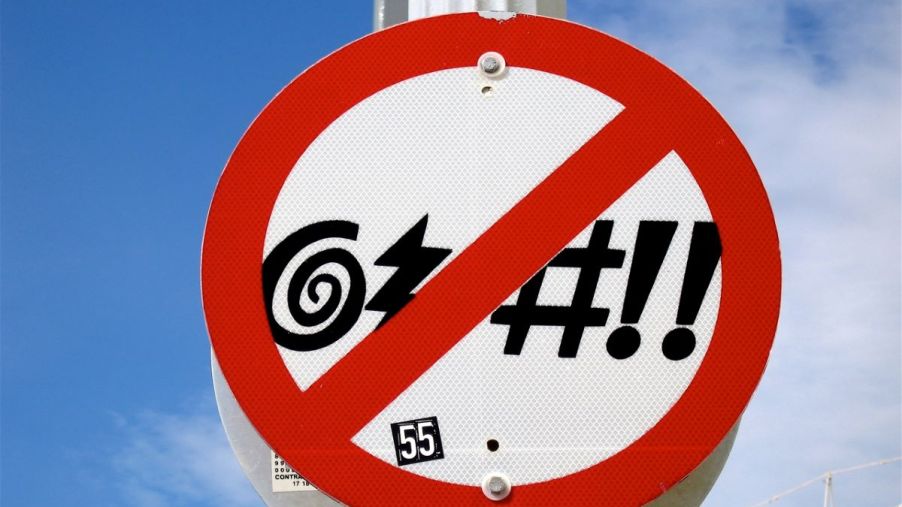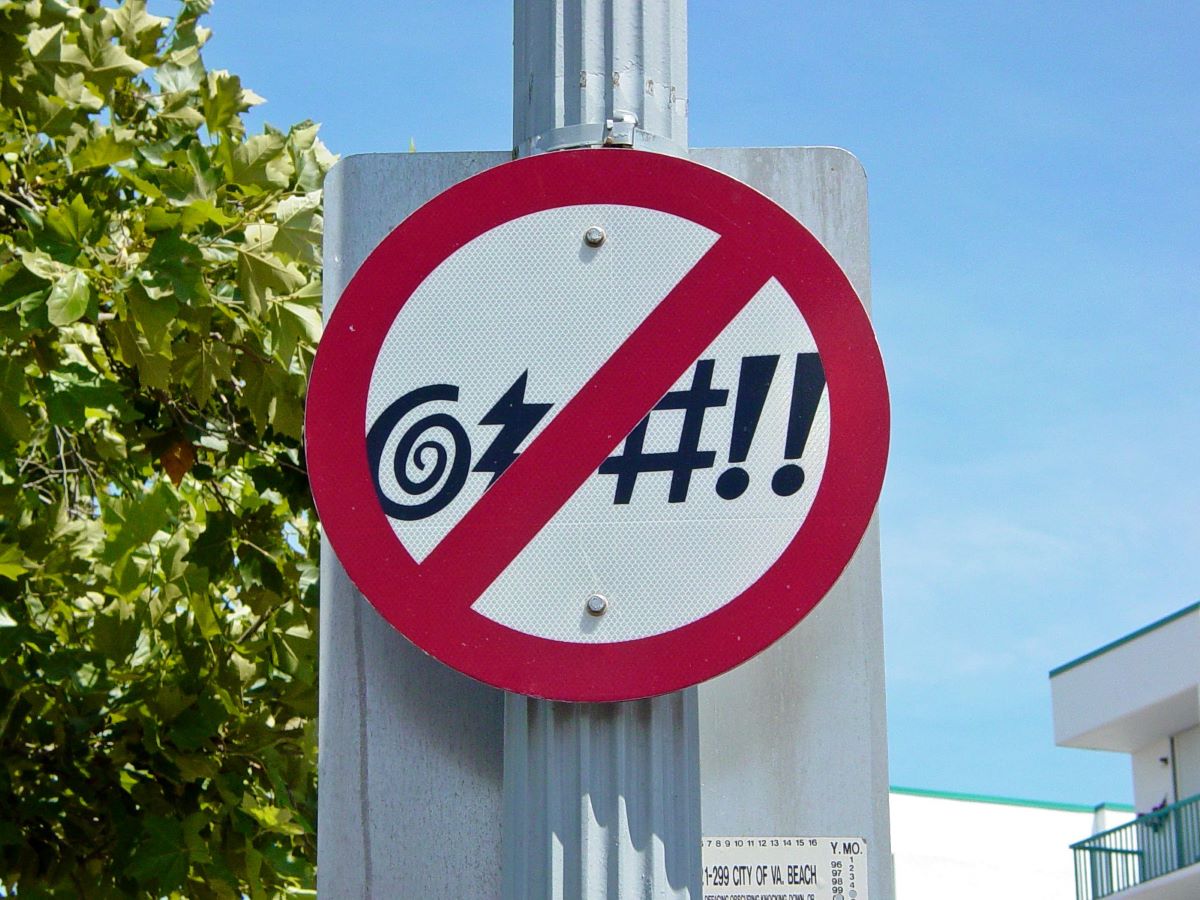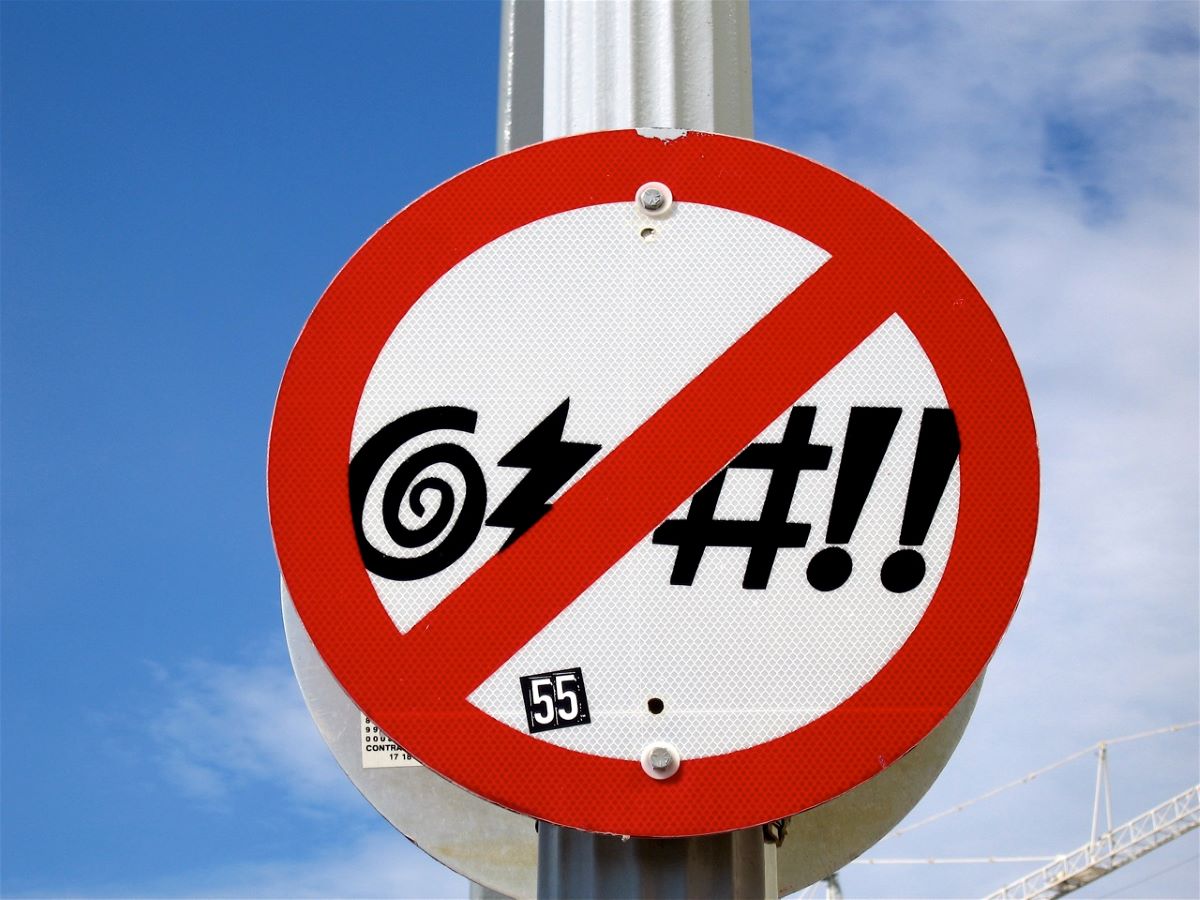
The Weird Street Sign No One Outside Virginia Beach Has Ever Heard Of
College spring breaks and the general rigmarole of coastal tourists often lead to unsavory speech when the waves are rolling in, and so is the summer shandy. Profanity, whether you like it or not, is a part of daily life for many, especially for those shouting out their car windows. Given the U.S. Constitution’s First Amendment, it would seem you could say anything in public, but not in Virginia Beach. In fact, dedicated to it was one weird street sign you’ve never heard of.
What is a grawlix?

When was the last time you and your friends used a grawlix? Probably recently if you’re in the Twittersphere or under 30. A grawlix is a typographical symbol, usually a combination of them, to make certain words, like profane vocabulary, unpronounceable. Vox says their first usage came in a 1901 comic strip, “Lady Bountiful Is Shocked,” which leaned heavily into exclamation points instead of swear words.
Nowadays, grawlixes are typically led by the first letter in the profane word. If you tried to type out George Carlin’s infamous “seven dirty words,” it would require more hashtags than your younger sister’s last Instagram post. But not for Virginia Beach’s laughably odd street sign; it’s all grawlix or nothing.
Cussing is a civil penalty
The state code was never very clear on this, but if it’s an S, P, F, C, M, or T-bomb in Virginia, it’s a misdemeanor offense. Or at least it was. Minted in 1950, the law states:
“If any person shall, in the presence or hearing of another, curse or abuse such other person, or use any violent abusive language to such person concerning himself or any of his relations, or otherwise use such language, under circumstances reasonably calculated to provoke a breach of the peace, he shall be guilty of a Class 3 misdemeanor.”
Code of Virginia §18.2-416 states
Nevertheless, “Profane swearing” was illegal in the commonwealth beginning in 1792, but is traced further to then-General George Washington’s 1776 Order Against Profanity, First Amendment Watch reports. At that time, the fine for “a vice hitherto little known in our American Army” was 83 cents. In 2020, a judge could impose a fine of up to $250, but the residents of Virginia Beach waved goodbye to the sign that year as well.
Official numbers for civil convictions and ticket payments are hard to come by. However, in 2019, 25 people paid the $250 fine, pumping $6,250 into the coastal city’s coffers. But it’s far less elsewhere. Arlington County, the bustling metropolis outside the nation’s capital in, only charged three people with public profanity laws over the course of two years.
Isn’t Virginia Beach’s weird street sign a violation of free speech?

That’s what many have said over the years, but it’s never been challenged. Regardless, most scholars point to Cohen v. California (1971).
Anti-war activist Paul Robert Cohen was arrested in 1968 in a Los Angeles, California, courthouse for wearing a jacket with the words on it stating, “F*** the Draft,” see those are grawlixes, too. In his protest, he was charged under a California statute that prohibited “maliciously and willfully disturbing the peace” through any offensive conduct. Cohen was convicted and ordered to pay a $50 fine or face 30 days in jail.
After two failed appeals, the case was taken by the U.S. Supreme Court. In a 5-4 decision repealing the California court decisions, Justice John Marshall Harlan II wrote quite famously, “One man’s vulgarity is another’s lyric.” Subsequently, any potential offense is not necessarily conducive to an offense against public peace, and the suppression of free speech cannot be justified. So, Cohen can wear his jacket, and you can drop an F-bomb beside a cop—but not to a cop, remember that.
Virginia Beach’s weird street sign is no more
During the Virginia General Assembly’s 2020 legislative session, state lawmakers said to hell with the anachronistic legal code. Both chambers voted to repeal based on HB 1071, sponsored by bipartisan duo Michael J. Webert (R-Fauquier County) and Dawn Adams (D-Richmond). House Republicans had introduced a similar bill in every legislative session since 2016. Still, it wasn’t until Democrats retook the majority that Delegate Webert could finally get his bill through to the governor.
The part-time legislator, full-time cattle farmer, said things changed when his colleagues across the aisle also agreed that the state’s code violated First Amendment free speech protections. For him, it was a particularly rewarding outcome. “When you’re working with cows and a 1,400-pound animal doesn’t do what you want it to, or steps on your feet, every once in a while something colorful comes out of your mouth,” he said to the Washington Post in 2017. And next time Bessie misbehaves, he won’t have to look over his shoulder for the 5-0, and you can curse your heart’s desire on the Virginia Beach boardwalk and elsewhere.
That same legislative session, the Western Hemisphere’s oldest political body also advanced into the present, repealing the law against fornication. That’s right, up until 2020, voluntary sexual intercourse by an unmarried person was illegal. But NPR reports that the Virginia General Assembly decided to keep the spitting ban, which one lawmaker called “yucky.”
Unfortunately, there isn’t a weird street sign associated with the public prohibition on saliva ejection. But we here at MotorBiscuit are looking for more weird street signs. Comment below if you have one for us, and we’ll check it out.


